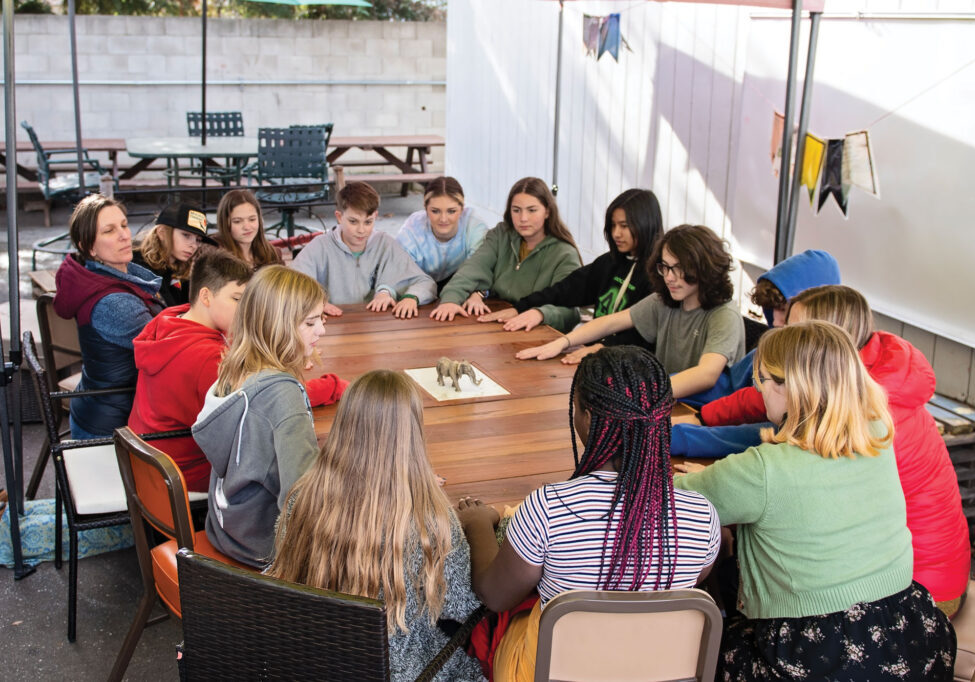What if your child could learn at their own pace, spend much of the day outdoors in nature getting plenty of exercise, synthesizing and integrating academic subjects through hands-on application that leads to a deeper understanding and a love of learning? More and more parents are exploring nontraditional approaches to teaching as the best way for their child to learn.
Nestled on a working farm near Ft. Jones in Siskiyou County, Farm School is just such a school – a truly unique, nontraditional learning center where children are physically active, learning outdoors as well as indoors. They participate in making healthy, nutritious scratch-cooked daily meals and learn through practical, real-world experiences in a combination of project-based learning, direct instruction, music and art.
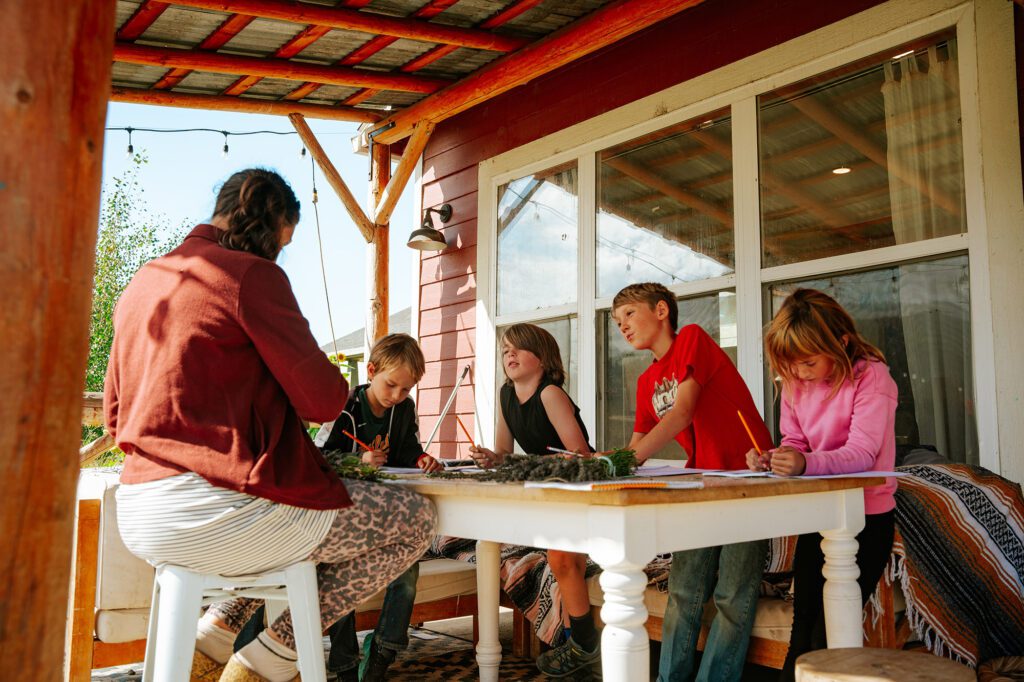
Integrating academic learning to solve real-world problems
“We try to focus integrating things that students are interested in with traditional academics, rather than learning isolated from real-world experiences,” says Niki Harris, director of Farm School and co-founder of Farm School along with her husband and farmer, Richie. “For example, in our farm and garden class, students built a greenhouse using real life practical math skills, reinforcing those skills through their activities in the farm and garden class.” As Niki explains, they get the pride of measuring and building a useful structure while employing academic learning to solve real-world problems.
Making learning progress visible without using traditional measures
One of the unique and innovative aspects of Farm School is that they don’t do standardized testing, have grade levels or give grades or report cards. “Children’s confidence can erode quickly if they don’t fit in the traditional pattern of learning; there’s often a stigma attached when a child learns differently or at a different pace than their peers,” says Niki. “That sticks with them their entire learning career and into adulthood. Some of the most brilliant young minds do not fit inside the traditional mold of school. At Farm School, we work to honor diverse learners and creators.”
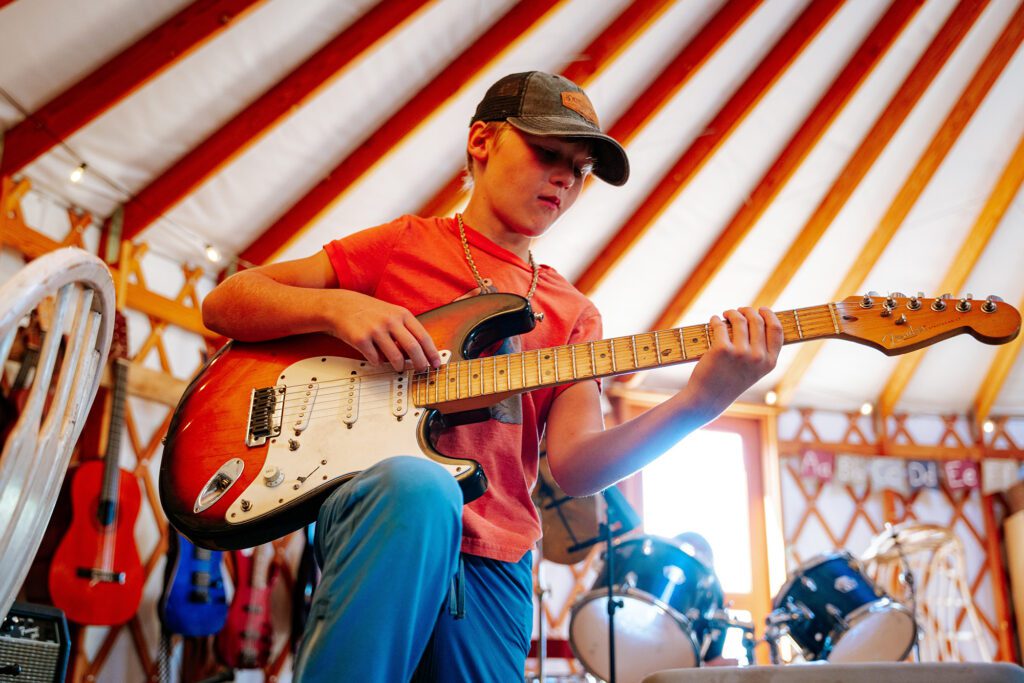
Farm School students learn to sing and play a variety of instruments, understand music theory and enjoy jamming together in an ensemble.
Instead of standardized tests and grades, “we make learning visible at the individual level through a variety of modalities, teacher observation being one of the most compelling,” Niki says. “Teachers are diligent about recording observations daily about each student’s progress, challenges and areas of growth.” Student portfolios are used to track progress and include samples of their work and self-reflections and assessments of their work and progress. Photos of the progress of their projects with teachers’ notes are also included. Students journal in different topic areas so their progress can be assessed over time in different subjects.
Evaluations are based on individual progress
“It’s highly individualized,” says Niki. “We don’t expect every child to learn the same things at the same time in the same way and regurgitate it to us. That’s not how humans learn. We all learn at different rates and in different ways.”
Teachers share with parents their observations of their child’s progress and their child’s portfolios, so parents are pulled in and engaged in understanding their child’s progress and growth. Students also have “performances of understanding” and demonstrations of projects. Once a year each student selects a project and is paired with a mentor in the community, sets a goal and works toward it. They document their work, recording self-reflection throughout the process in their journals. They then present the project they are working on and share it with the community in a Spring Showcase.
Farm School partners with public schools, college prep institutions
Farm School offers enrichment programs that children from traditional schools can attend, afterschool programs, music programs and summer school camps open to public school students. “We have a great relationship with our public school district. We work together to support all children in our small community through a variety of programs,” Niki says.
In preparation for attending a traditional college, students who attend schools that do not generate traditional metrices can work with the Mastery Transcript Consortium Program to co-create uniquely flexible and scalable learning records to solve the challenge of credentialing. This program is currently accepted by over 600 universities and growing nationwide.
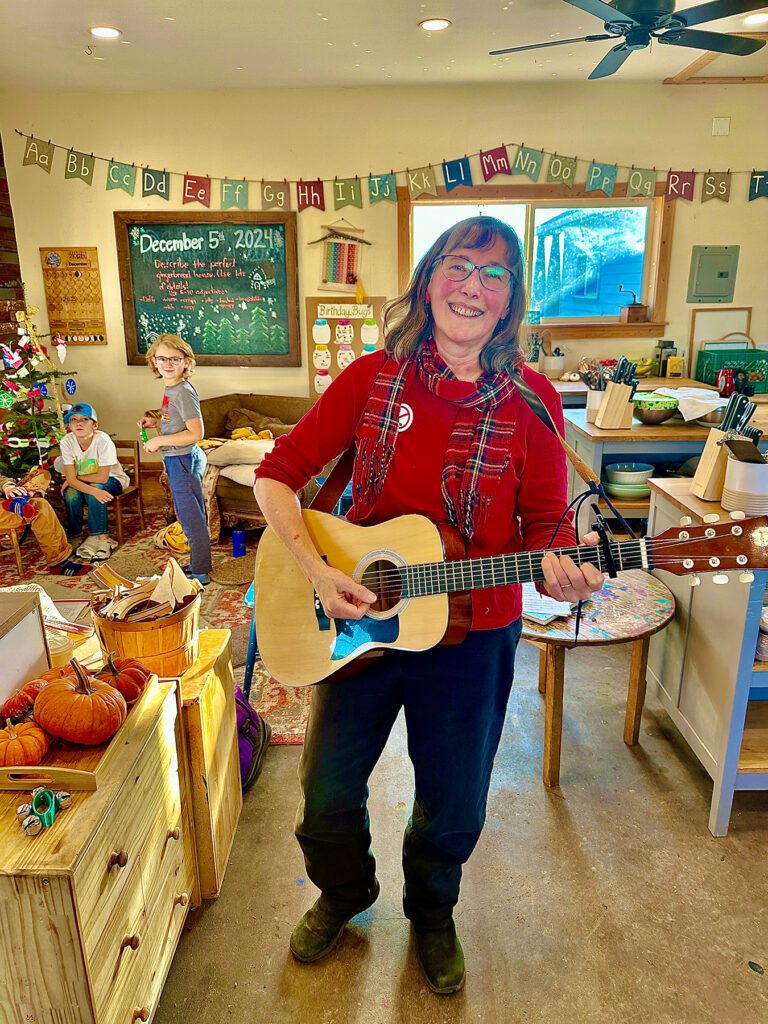
Farm School music teacher Annie Kramer combines her love of music and her joyful, gentle, patient nature to help children develop their musical talents and, most importantly, gain self-esteem and a feeling of accomplishment. Photos provided by Farm School.
Music makes learning fun while integrating academic skills
In addition to learning through farm and garden experiences, students learn important life skills through music instruction and performance. Music instructors Annie Kramer and Thomas Walker lead students on a musical journey that incorporates social emotional learning with the joy of music, simultaneously incorporating academic skills such as math and memorization.
“Music permeates and enriches our lives, and our brains are wired to make and respond to music,” Annie says. “Musical experiences promote brain development, provide a foundation for academic skills and enhance social and emotional development.” She adds, “But most of all, music is FUN! And my goal is to share the joy of music with the children, so that it will always be an important part of their lives.”
Annie provides music enrichment experiences to Farm School students through teaching them traditional and contemporary folk songs, with an emphasis on songs that engage several senses and skills simultaneously, such as clapping out the rhythm or combining movements with the tune and lyrics. Children play rhythm games, learn basic music notation, make music-themed crafts and learn folk dances such as the Virginia Reel, Appalachian clogging and Maypole dancing. They learn to sing rounds, to introduce harmonizing and to work on group timing and cohesion.
Annie usually accompanies the students on guitar and several times during the school year she invites guest musicians to perform for the students, giving them the opportunity to experience firsthand a variety of instruments, such as the banjo, flute, violin, upright bass and even bagpipes.

Talented musician Thomas Walker teaches Farm School students a wide variety of musical instruments, how to play in an ensemble and, most remarkably, to enjoy learning music theory.
Thomas, an accomplished musician with a diverse musical background, brings rich musical expertise and a truly inspiring passion to his students. Thomas teaches music theory and how to play a wide variety of instruments in an ensemble setting. Students learn rhythm, how to work together, practice math skills inherent in reading music and gain memorization skills. “The coolest thing is to see students come from never having touched an instrument to playing and reading charts. That’s been really rewarding,” Thomas says. “The great thing about Farm School is that students of all ages can participate at any level they are able.” There aren’t artificial limits on what a child is taught or viewed as able to learn at a specific age. “Children can advance as fast as they wish or are able. As much as they can handle, we’ll do.”
But most of all, Thomas says, “I like the opportunity to just jam with students in class, like students who love music would normally do at home after school. Tinkering is the way musicians learn and grow musically.”
To learn more about Farm School, go to pastureraisedkids.org or call 530-643-6551 or email niki@pastureraisedkids.org.
Posted in: Art & Music, Education
Comment Policy: All viewpoints are welcome, but comments should remain relevant. Personal attacks, profanity, and aggressive behavior are not allowed. No spam, advertising, or promoting of products/services. Please, only use your real name and limit the amount of links submitted in your comment.
You Might Also Like...
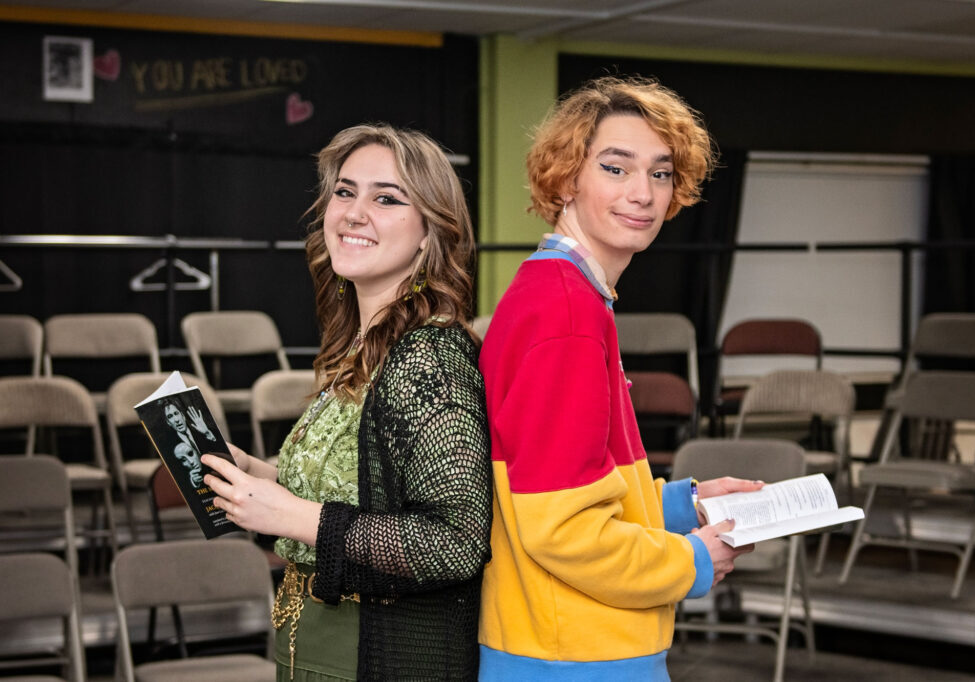
Inspire School of Arts and Science – Empowering Students To Discover Their Talents
Engaging with art is essential to the human experience. Almost as soon as motor skills are developed, children communicate through artistic expression. The arts challenge us with different points of […]

Children Who Participate in Theater Reap Lifelong Benefits
If you have a child with a flair for the dramatic, who loves to sing and dance, or wants to be part of a team without playing sports, theater may […]
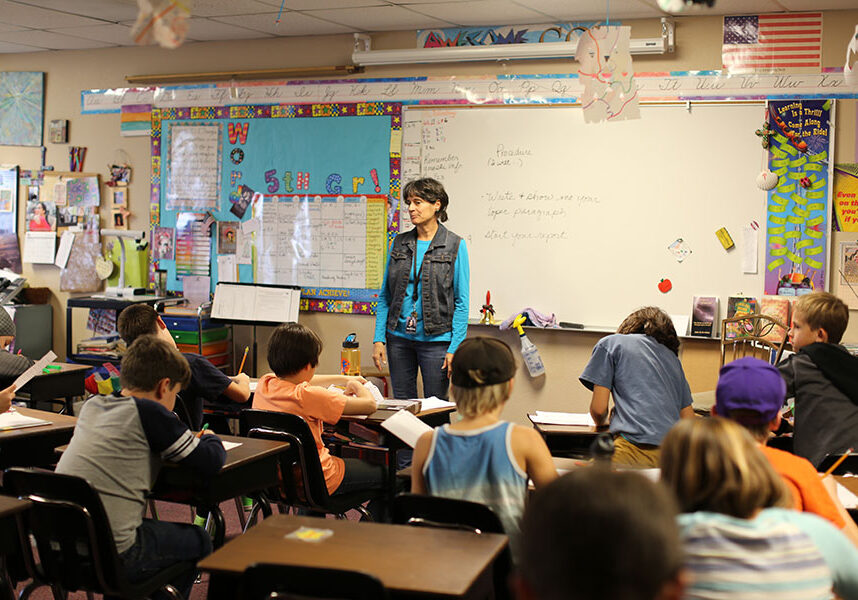
Common Core: North State Kids to Bring Their Computer Savvy on Test Day
This spring, North State students will have to bring some computer savvy along with a sharpened pencil to school on test day, when millions of California’s kids sit down for […]
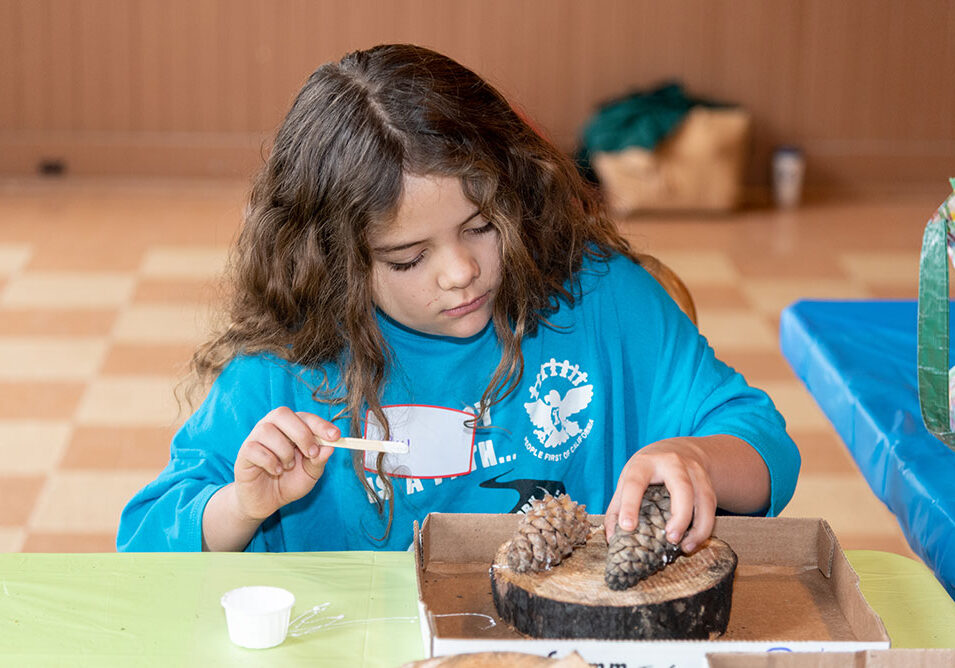
ART from Ashes Youth Workshops
During the wildfire season of 2007, over 9,000 separate wildfires burned approximately 1.5 million acres in California. Out of this devastation the nonprofit ART from the Ashes (artfromtheashes.org) was created. […]



